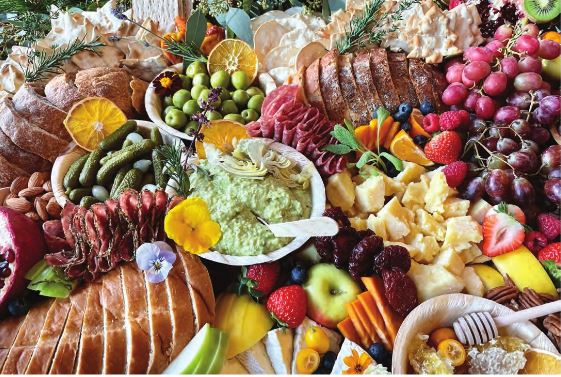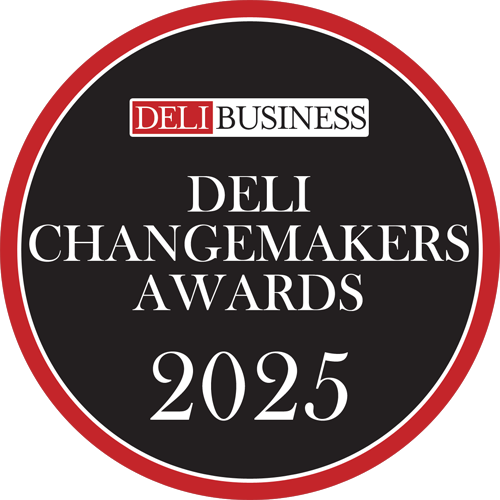Packaging Going Green at the Deli
More sustainable methods are penetrating the deli department
May 1, 2023 | 7 min to read
The sustainability movement has significantly influenced packaging in supermarkets, particularly in deli departments, with over 50% of U.S. consumers concerned about environmental impact. Companies like Placon and World Centric are innovating recyclable and biodegradable options to meet demand, such as fiber-based products and tamper-evident containers. Despite higher initial costs, sustainable packaging enhances brand appeal and can improve product shelf life, reflecting a broader consumer shift toward eco-friendly choices.

For the past decade, the sustainability movement has made a big impact on packaging, as the increased interest by people wanting to be earth-friendly has changed the way many companies package their products. This is especially true in the deli department.
“Supermarkets and consumers are focused more and more on sustainability,” says William Chandler, business development sales manager for AFC Materials Group, based in Lake in the Hills, IL. “This is a broad term but for packaging, could mean utilizing more recyclable materials where possible or cutting down on the amount of packaging used where possible.”
For instance, some goods are double bagged that do not necessarily need to be, and that’s one area where deli departments are making changes.
Now more than ever, consumers are concerned about the environmental implications of the products they buy, the packaging it comes in and the businesses they support. It’s estimated that more than 50% of U.S. consumers are highly concerned about the environmental impact of packaging in general.
Kali Kinzinger, product manager of Placon, headquartered in Madison, WI, notes the company offers thermo-form containers and recycled material for all of its retail packaging.
“Placon has its own recycling facility on-site at our headquarters, and we use what’s recycled to make stock-food packaging from tamper-evident cups, giant salad bowls, catering trays and take-out, microwavable packaging for meals and wings,” she says. “We have a full breadth of offerings for the deli department.”
She notes plastic often gets bad rap, but it is arguably the most sustainable material to make packaging out of.
“It requires less energy to recycle plastic than it does to recycle paper or glass,” Kinzinger says. “And that uses less energy than creating virgin materials for anything. It’s also lightweight, so it ships easier and is less intensive on finite resources.”
Deven Young, vice president of sales for World Centric, based in Rohnert Park, CA, explains grab-and-go departments and supermarket delis use a lot of petroleum-based plastic because most consumers eat with their eyes — in other words, they expect to be able to see the food they’re choosing, creating a need for clear packaging.
“There are many more options for food to go for consumer convenience, and clear packaging makes it easy to make a decision,” she says. “The packaging is usually PET (polyethylene terephthalate) and PP (polypropylene), two of the most commonly used plastic polymers in food packaging.”
The problem is these polymers may not be easy to recycle, as most recycling facilities may not accept them, especially when contaminated with food waste.
PLA (polylactic acid), a bioplastic made from plant sugars, is an alternative that uses less fossil fuels and emits less greenhouse emissions. It can also be composted where commercial facilities exist, and overall is a much better alternative than PET or PP.
“Fiber trays, cups, bowls, cutlery and containers that are made from renewable resources like sugarcane, wheat straw and bamboo offer a great alternative to replace single-use plastics in the deli operations,” says Young.
Fiber boxes, bowls and cups are the items most commonly seen in supermarket delis. In recent years and with new legislation, there has been a big shift away from single-use plastics, replacing single-use plastic cutlery.
“Product design of the fiber and bamboo cutlery in the industry has evolved to perform competitively with petroleum plastic alternatives, and it is available to respond to both legislation and consumer demand for single-use plastic alternatives,” says Young.
Traditional food packaging is typically made from petroleum plastics and expanded polystyrene (or Styrofoam). These materials contribute to society’s over-extraction of the earth’s natural resources in order to be created and contribute to the earth’s mounting waste.
“By utilizing leftover plant materials that would otherwise be incinerated, we are able to reuse valuable renewable resources,” says Young. “In the same way that consumers want the food they purchase to come in sustainable packaging, they want the food in the packaging to be sustainable too, such as organic and locally sourced.”
Pros and Cons of Sustainability
Implementing more sustainable packaging comes with higher up-front costs but the advantages are many, starting with the benefit of protecting the environment.
“Recyclable packaging can be viewed by consumers as a market differentiator when used for products where it isn’t currently common, increasing brand awareness and appeal for certain demographics,” says Chandler. “There can also be advantages from changing materials that aren’t clear until you explore available options.”
For example, a third-party shelf life study in the produce market found that AFC Material Group was able to extend the shelf life of carrots by up to seven days when switching to its NoW paper bags from a plastic wrapped tray due to improved breathability. This same process can be found in the deli department for a variety of options.
New and Improved
In a time when the earth’s ecological resources are being stretched thinner than ever before, consumers are looking to support brands that are finding ways to innovate products that are better for the planet.
Therefore, World Centric is focusing on creating more fiber products from sugarcane, bamboo and wheat straw, which can be better alternatives and lessen environmental impact.
“In 2023, we are introducing our fiber see-through lids to replace bioplastic lids, reducing the amount of bioplastic used and allowing for the customer to be able to see the food before purchasing,” says Young. “Earlier this year, we also launched our new bamboo cutlery, which is made from FSC-Certified bamboo at a factory that relies on solar-powered energy. Because of this and the carbon sequestration of bamboo roots, these utensils are considered a carbon negative product.”
As part of its own commitment to sustainability, Sayreville, NJ-based food packaging company Sabert Corp. has launched a new line of eco-friendly products that are being utilized in supermarket delis.
The company launched five new packaging and catering products made from various materials with unique sustainability benefits, such as recyclability and recycled content usage. The products can be used for on-shelf merchandising, catering, takeout and on-the-go, making these a fit for supermarket delis.
Among the new products are Square Paper Bowls — easily recycled paperboard bowls designed for both cold and warm applications that are grease resistant; and Pulp Max Bowls — microwave- and refrigerator-safe bowls designed for curbside pickup, home delivery or carryout use.
“As the demand for carryout, catering and on-the-go food delivery continues to trend upward, we are excited to expand our already extensive portfolio of packaging products and offerings with innovative solutions that support our commitment to reducing environmental waste,” says Stephny Halstead, vice president, marketing & new product development.
AFC Materials Group has recently introduced two new products that focus on green measures in packaging.
“NoWaste technology is our platform for maintaining the recyclability of our paper packaging when used for food applications,” says Chandler. “For instance, we can make a bread bag with a transparent window that is still certified as curbside recyclable in the United States.”
The company also offers Oven2Go, a line of paper packaging that is ovenable up to 525 degrees F.
“This allows a sandwich to be cooked inside our bag and handed directly off to the customer in one package, which minimizes handling of the food and reduces the need for additional packaging during the process,” says Chandler.
In December, Placon launched its new tamper-evident PET Round Deli line, primarily for cold items such as salads and sandwiches.
“It’s a two-piece container, but the lid itself is tight enough so when it snaps in place, you can’t get it off without tearing the tamper-evident portion,” says Kinzinger. “And the lid goes back on, so it’s reusable.”
Pandemic Packaging
When the COVID-19 pandemic reared its ugly head in March of 2020, many delis switched from bulk cutlery to wrapped, and the foodservice takeout and delivery market as a whole more than doubled.
During this time, World Centric offered takeout containers made from plant-based materials, like its NoTree line made from bamboo and sugarcane papers. It also launched a Touchless Cutlery Dispenser where the cutlery came in a factory-sealed bag and was dispensed one-by-one, avoiding a pile up of dispensed but unused utensils that end up contaminated.
The pandemic exacerbated the difficulties of importing packaging from overseas. Shipping costs doubled, ports became congested and the entire supply chain was strained.
“This led to an increased interest in domestic production, which continues now, even if some of those initial factors have lessened in severity,” says Chandler.
Placon noticed an increased demand for tamper-evidence packaging during the pandemic and saw consumers gravitate more towards pre-packaged meals in the deli.
“It’s easier to grab a thing of coleslaw rather than waiting in line to get it scooped, and it’s in the tamper-evident packaging so you know no one else has touched it, and it hasn’t been exposed to elements sitting out all day,” says Kinzinger. “We came up with more meal kits and different sizes with inserts during this time.”
Vicki Klanang, marketing and brand specialist for AFC Materials Group, believes there will be more of a concerted effort by packaging companies to push toward more sustainable packaging options in the years ahead.
“There has been a push of consumers wanting to see products that are sustainable, and I think there will be more of that in the future,” she says. “Consumers want to be seen as eco-friendly shoppers, and more are making choices based on a brand’s sustainability.”
3 of 7 article in DeliBusiness Apr/May 2023

